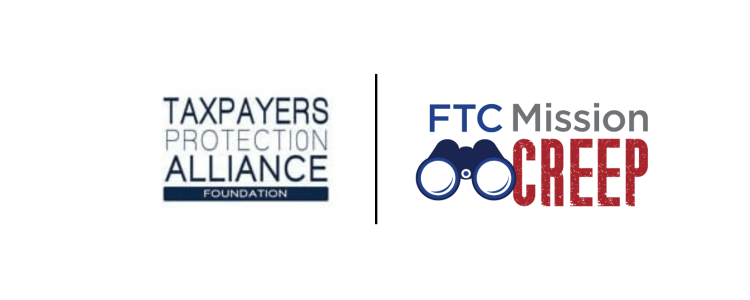
Congress and the courts must rein in the rogue Federal Trade Commission
FTC Mission Creep is a project of the Taxpayers Protection Alliance Foundation (TPAF) to document the abuses of power and norms violations that typify today’s FTC. During the Biden era, the FTC has embarked on a radical trajectory that, if continued, will likely hamstring industry, and raise prices for consumers. Its current agenda runs contrary to established legal precedent and sound economic principles.
Properly understood, the purpose of antitrust enforcement is to protect markets and consumers from the predations of unethical and anticompetitive market actors, not to protect individual competitors or specific business models. To achieve the FTC’s goal, enforcers and judges must rely on the consumer-welfare standard and the rule of reason, which tether antitrust enforcement to sound economics. Moreover, to provide businesses with predictability, officials must make clear what sort of behavior breaches the law.
FTC staff’s belief in leadership’s integrity has dropped 87% to 49%
sources: 1. Office of Personnel Management, “2020 Office of Personnel Management Federal Employee Viewpoint Survey: Report by Agency,” accessed July 2023. 2. Office of Personnel Management, “2022 Office of Personnel Management Federal Employee Viewpoint Survey: Report by Agency,” accessed July 2023.
These economically prudent, pro-competitive doctrines arose from decades of antitrust overreach in the early- to mid-20th century. Before their emergence, federal enforcers – dedicated to the notion that bigness is necessarily bad – ran roughshod over American businesses. The dominant view was that small and inefficient competitors must be protected from innovative business models that provided to consumers cheaper, better products. Consumers quite literally paid the price.
Former FTC Chairman Timothy J. Muris wrote, “So strong was the populist wave and the conviction that ‘big is bad’ that lawyers defending mergers would desperately argue their merger did not lead to efficiencies and cost savings, lest the merger be viewed as one that allowed the merged firms to gain market share (i.e., get bigger) because cost savings would reduce prices.” Supreme Court Justice Potter Stewart famously noted of this period of merger enforcement, “The sole consistency that I can find is that…the Government always wins.”
In recent years, a coalition of progressive theorists have advocated decidedly regressive notions of antitrust. Known as neo-Brandeisians – after famed trustbuster and Supreme Court Justice Louis Brandeis – they seek to revive the notion that big is bad and to greatly expand the power of the FTC. Since 2021 – with the installation of neo-Brandeisian academic Lina Khan as FTC chair – federal enforcers have embarked on a campaign to undo the last half century of antitrust precedent.
FTC Chair Lina Khan is 0-4 in merger trials
source: Rep. Kevin Kiley (R-Calif.), “House Judiciary Committee Hearing: Oversight of the Federal Trade Commission,” July 13, 2023.
In a policy statement released in November 2022, the FTC rejected the consumer-welfare standard. The agency instead adopted an “I know it when I see it” standard that fails to provide businesses with concrete guidance. The FTC wants free rein to take aggressive action against companies based on commissioners’ subjective, and often myopic, conceptions of “fair” competition. As then-Commissioner Christine Wilson argued in dissent, “the Policy Statement provides that merely labeling conduct with an appropriate adjective can establish liability.”
The policy statement merely codified the FTC’s new modus operandi. The agency has launched myriad enforcement actions that rely on novel and dubious economic theories. While courts – including one of FTC’s in-house administrative judges – have rejected these theories, the FTC has nonetheless managed successfully to change businesses’ behavior through bullying tactics and settlement seeking.
Resources
The Courts Reject the FTC’s Non-Compete Power Grab
Global Regulators Want To Hamstring AI Innovation
Biden’s Antitrust Approach will Harm Small Businesses and Raise Prices at the Counter
Biden Regulatory Hammer Targets Video Game Industry
Lina Khan’s ‘Wins’ Are Judicial Rebukes of Her Radical Theories
Will Antitrust Policy Smother the Power of AI?
The FTC’s Plan To Revive A Zombie Bill Will Undermine America’s Supply Chain
The FTC’s Investigation of Reddit Underscores a Scattered, Wrathful Khan
The FTC’s Contradictory Case Against Mergers
The Biden Administration’s Embrace of Julie Su Is a Confusing Mess
FTC’s Aggressive Tactics Strike Fear in Tech
How the Neo-Brandeisians Are Undermining Themselves
Lina Khan Keeps Dodging Congressional Oversight to Effect Her Radical Agenda
The FTC’s Case Against Amazon is a Case Against American Consumers
Federal Trade Commission doesn’t have the evidence in its Amazon case
Amazon Positions Its Independent Sellers to Prosper
Lina Khan’s FTC Is Importing Crushing European Tech Policy
President Biden Is Trying To Reanimate Defunct Antitrust Theories
Big Tech Regulation Will Only Harm Conservative Speech Online
Federal antitrust bill would grant ‘sweeping new powers’ to federal bureaucrats
The Sale of Yahoo and AOL Wrecks All the ‘Big Tech’ Hysteria
FTC and DOJ Merger Guidelines Harm Competition
Watchdog Asks Congress to Rein In Biden’s Rogue FTC
TPA Sends Letter to House Oversight on FTC Accountability
TPA Slams FTC’s Latest Move Against Microsoft
Consumer Watchdog Slams Latest FTC Move Targeting American Tech Companies
TPA Sends Letter to Judiciary Committees Urging Oversight of the FTC
Taxpayer Watchdog Calls for FTC Oversight After Wilson Resignation
TPA Urges FTC to Reject Antitrust Action Against Facebook
TPA Submits Comments to FTC on Commercial Surveillance and Data Security
Commentary: The Power Broker Her
CEI Hill Event Shows How the FTC is Burdening Small Business
The Feds’ ChatGPT Probe Threatens Free Speech
WSJ: The FTC Heads for Legal Trouble
WSJ: Lina Khan’s Artificial Intelligence
Reason: The FTC Wants To Outlaw Noncompete Clauses, but Does It Have the Authority?
WSJ: Lina Khan Whiffs on the Microsoft-Activision Tie-Up
Reason: FTC Commissioner Resigns To Protest Agency’s ‘Disregard for the Rule of Law’
WSJ: Lina Khan’s Recusal Coverup
Reason: The FTC’s Antitrust Radicals Are Rebuked Again in Federal Court
WSJ: Why I’m Resigning as an FTC Commissioner
WSJ: The FTC Is Working With the EU to Hamstring U.S. Companies
FTC Mission Creep

